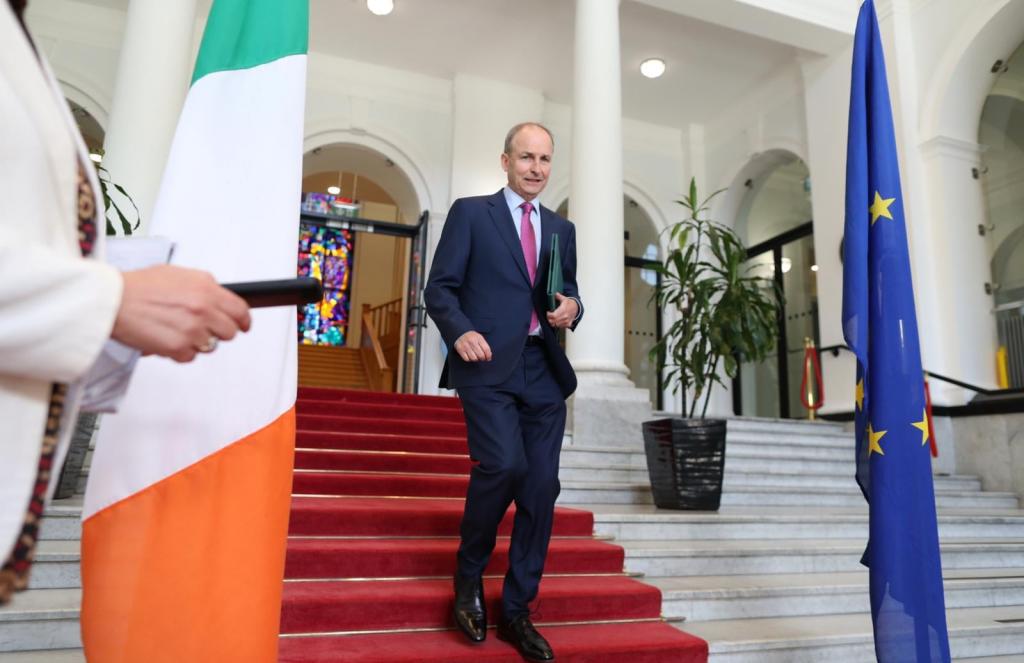Thessaloniki gets ready for its metro launch in November
The underground rapid transit lines have been under construction for almost two decades due to various project delays
 TheMayor.EU logo
TheMayor.EU logo 
Taoiseach (Prime Minister) Micheál Martin on his way to announce the pause to indoor dining reopening, Source: merrionstreet.ie
A system to verify vaccination or immunity will be devised by 19 July
In a blow to the hospitality industry, the Irish government has put on hold, for an unspecified period of time, the planned resumption of indoor dining and a number of other indoor activities from 5 July. The next phase of re-opening in line with Recovery and Resilience: The Path Ahead plan will be based on a cautious approach with an emphasis on lower-risk activities, the government announced yesterday.
The unexpected about-face is due to stern advice from the National Public Health Emergency Team (NPHET) regarding the projected spread of the Delta variant in Ireland and the risk it poses, particularly to people without full vaccination coverage. NPHET has prepared five scenarios of epidemic evolution, the worst-case one foreseeing almost 700 000 cases and up to 2170 deaths from Covid-19 between 1 July and 30 September if no restraints remain in place.
Addressing the nation on RTÉ channels, Taoiseach (Prime Minister) Micheál Martin said that this is a difficult decision for so many businesses which had believed they would be able to open next week. He described the coronavirus situation as a race between the variants and vaccines, recalling that the vaccination programme continues at a fast pace with over 4 million doses administered and over 40 percent of the population in Ireland now fully vaccinated.
The following changes will take effect from Monday, 5 July:
Ireland’s overly cautious approach to reopening indoor dining due to concerns about the spread of the Delta variant is at odds with its nearest neighbours, comments RTÉ. Other European Union member states, including France, Belgium, Italy, the Netherlands, and Portugal, allowed indoor hospitality to go ahead weeks ago, with caps on capacity and limits on the number of people per table. Nightclubs have also reopened in parts of Spain and the Netherlands.
The government’s decision to postpone the resumption of indoor dining has come under fire both from the hospitality sector and the political opposition. Labour leader Alan Kelly described the vaccine pass initiative as "bananas" and "discriminatory", while Sinn Féin expects to "better understand" the data and modelling that led to NPHET’s apocalyptic advice to Government.
Tánaiste (Deputy Prime Minister) Leo Varadkar, quoted by RTE, said the NPHET’s worst-case scenario appears to be too pessimistic and hopes it will prove to be wrong, but the balance of risk is currently very high. He said the next three weeks would be used to speed up the vaccine programme and to monitor the Delta wave based on what is happening in the UK.
Varadkar’s comments come ahead of today’s talks where he, Minister for Health Stephen Donnelly and Minister for Tourism Catherine Martin will meet representatives of the Hospitality Forum, an association of hotel, restaurant and licensed vintner groups.
If you want to keep up with how European cities and regions are changing, follow us on Facebook, Twitter and Instagram.

The underground rapid transit lines have been under construction for almost two decades due to various project delays

Now you can get your wine in Talence by paying directly in Bitcoin

That’s because the state has to spend money on updating the railway infrastructure rather than subsidizing the cost of the popular pass

Rethinking renewable energy sources for the urban landscape

The examples, compiled by Beyond Fossil Fuels, can inform and inspire communities and entrepreneurs that still feel trepidation at the prospect of energy transition

Now you can get your wine in Talence by paying directly in Bitcoin

The 10th European Conference on Sustainable Cities and Towns (ESCT) sets the stage for stronger cooperation between the EU, national and local level to fast track Europe's transition to climate neutrality.

At least, that’s the promise made by the mayor of Paris, Anne Hidalgo

The underground rapid transit lines have been under construction for almost two decades due to various project delays

At least, that’s the promise made by the mayor of Paris, Anne Hidalgo

Hostal de Pinós is located in the geographical centre of the autonomous region

Despite its church-y name, the district has long been known as the hangout spot for the artsy crowds

Urban dwellers across the EU are having a say in making their surroundings friendlier to people and the environment.

Forests in the EU can help green the European construction industry and bolster a continent-wide push for architectural improvements.

Apply by 10 November and do your part for the transformation of European public spaces

An interview with the Mayor of a Polish city that seeks to reinvent itself

An interview with the newly elected ICLEI President and Mayor of Malmö

A conversation with the Mayor of Lisbon about the spirit and dimensions of innovation present in the Portuguese capital














